If you’ve ever noticed swollen, twisted veins on your legs, you’re not alone. Varicose veins are a common condition that affects millions of people, causing not only cosmetic concerns but also discomfort and pain. While they can be a nuisance, there are natural and effective ways to manage their symptoms. Enter yoga—a practice that offers a gentle yet powerful approach to improving blood circulation, strengthening muscles, and promoting overall well-being. In this blog, we’ll explore what varicose veins are, their causes, and how specific yoga poses can help alleviate discomfort and improve circulation.
What Are Varicose Veins and Why Do They Occur?
Varicose veins are enlarged, twisted veins that typically occur in the legs and feet. They develop when the valves within the veins weaken or become damaged, causing blood to pool and the veins to stretch. This condition is commonly seen in the legs due to the added pressure of standing and walking. Symptoms may include aching, heaviness, cramping, and swelling. Various factors contribute to the development of varicose veins, including:
- Genetics: A family history of varicose veins can increase your likelihood of developing them.
- Age: The risk of varicose veins increases with age as veins lose elasticity.
- Hormonal Changes: Hormonal fluctuations during pregnancy or menopause can weaken vein walls (know more here).
- Lifestyle Factors: Prolonged periods of standing or sitting can impede circulation and increase pressure on the veins.
How Yoga Can Help with Varicose Veins?
Yoga is a holistic practice that effectively manages various health conditions, including varicose veins. Here’s how yoga can alleviate symptoms and improve vein health:
Promotes Better Blood Circulation – Yoga enhances blood flow throughout the body. Poses that elevate the legs help combat blood pooling, reducing feelings of heaviness and discomfort associated with varicose veins.
Strengthens Muscles and Supports Vein Health – By increasing flexibility and strengthening leg and core muscles, yoga supports vein function and prevents further damage. Poses like the Warrior and Bridge Poses build strength and stability, promoting vascular health.
Reduces Inflammation and Pain – Yoga’s anti-inflammatory effects can alleviate swelling and discomfort in the legs. The focus on breath and relaxation helps lower stress levels, reducing tension and pain related to varicose veins.
Enhances Mind-Body Connection – Yoga encourages mindfulness and body awareness, allowing individuals to recognize early signs of discomfort. This awareness promotes timely action and fosters a sense of calm, which can help manage stress contributing to physical symptoms.
Top 7 Yoga Poses for Ease Varicose Veins
Incorporating these seven yoga poses into your practice can help alleviate the discomfort associated with varicose veins and improve blood circulation:
1. Legs-Up-the-Wall Pose (Viparita Karani)
This restorative pose is excellent for promoting relaxation and reversing the effects of gravity on the legs. It encourages blood flow back to the heart, helping to relieve swelling and fatigue.
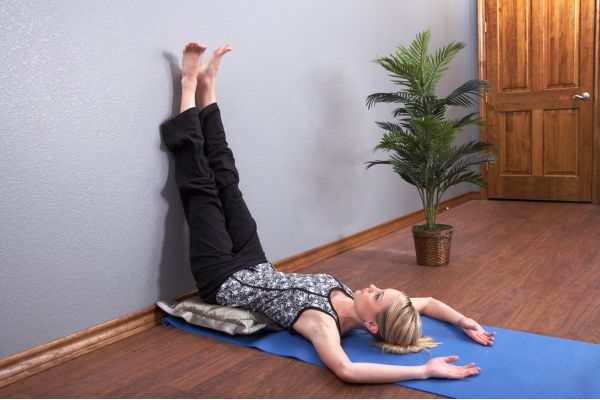
How to Do It:
- Sit next to a wall and lie back, bringing your legs up the wall.
- Keep your arms relaxed at your sides or place them on your belly.
- Hold this position for 5 to 15 minutes, focusing on your breath.
2. Downward-Facing Dog (Adho Mukha Svanasana)
This classic pose inverts the body, facilitating blood flow from the legs to the heart. It stretches the hamstrings and calves, helping to alleviate tension.
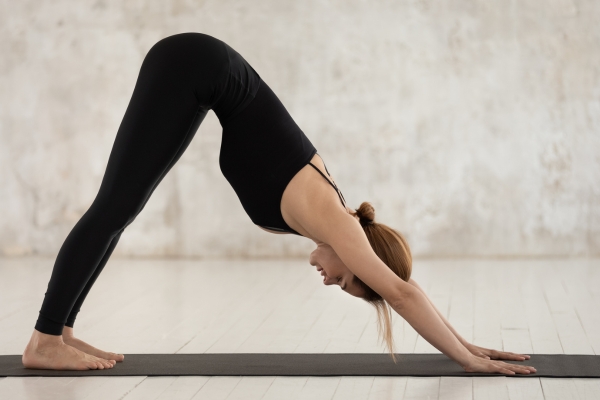
How to Do It:
- Begin on all fours with your wrists under your shoulders and knees under your hips.
- Tuck your toes and lift your hips toward the ceiling, straightening your legs.
- Keep your head between your arms and your heels reaching toward the ground. Hold for 5 to 10 breaths.
3. Bridge Pose (Setu Bandhasana)
Bridge Pose elevates the hips, relieving pressure from the legs while opening the chest. It strengthens the legs and lower back, promoting better circulation.

How to Do It:
- Lie on your back with your knees bent and feet flat on the floor, hip-width apart.
- Press your feet into the ground and lift your hips toward the ceiling.
- Clasp your hands under your back and hold for 5 to 10 breaths.
4. Standing Forward Bend (Uttanasana)
This pose stretches the hamstrings and relieves tension in the legs, promoting circulation. It also helps calm the mind and reduce stress.
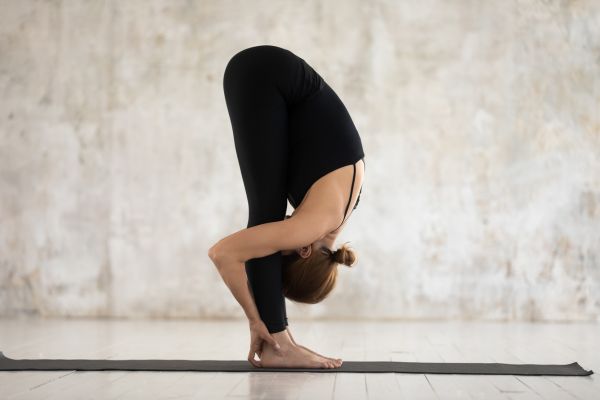
How to Do It:
- Stand tall with your feet together.
- Hinge at your hips and fold forward, letting your head hang toward the floor.
- Hold onto your elbows or let your arms dangle, and breathe deeply for 5 to 10 breaths.
5. Mountain Pose (Tadasana)
Mountain Pose enhances posture and engages the legs, aiding in blood flow. It promotes grounding and stability, serving as a foundation for other poses.
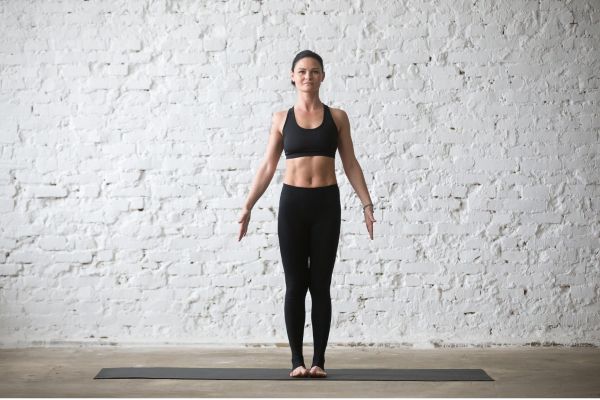
How to Do It:
- Stand with your feet together and arms at your sides.
- Engage your thighs and lift your arms overhead, reaching your fingertips toward the ceiling.
- Hold for 5 to 10 breaths, focusing on grounding your feet.
6. Warrior I (Virabhadrasana I)
Warrior I strengthens the legs and opens the hips while promoting stability. This pose enhances circulation and helps build confidence and focus.
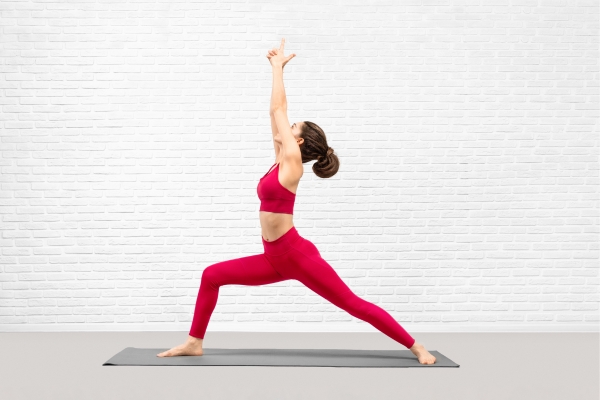
How to Do It:
- Start in Mountain Pose. Step your left foot back and bend your right knee over your ankle.
- Raise your arms overhead, keeping your shoulders relaxed.
- Hold for 5 to 10 breaths, then switch sides.
7. Child’s Pose (Balasana)
Child’s Pose is a gentle resting pose that promotes relaxation and helps relieve tension in the legs. It’s a great way to conclude your practice, allowing your body to absorb the benefits of the previous poses.

How to Do It:
- Kneel on the floor and sit back on your heels.
- Reach your arms forward on the ground, resting your forehead down.
- Hold for 5 to 10 breaths, allowing your body to relax.
Conclusion: Embrace the Healing Power of Yoga
Incorporating these yoga poses into your daily routine can significantly improve circulation and relieve the discomfort associated with varicose veins. Regular practice, combined with mindfulness and relaxation techniques, can lead to long-lasting benefits for your vein health.
If you’re interested in deepening your yoga practice or starting a journey as a teacher, consider enrolling in a yoga teacher training course in Pune at Swasti Yoga Center. This training will not only enhance your skills but also equip you with the knowledge to help others in their wellness journeys. Embrace the power of yoga for a healthier you!


